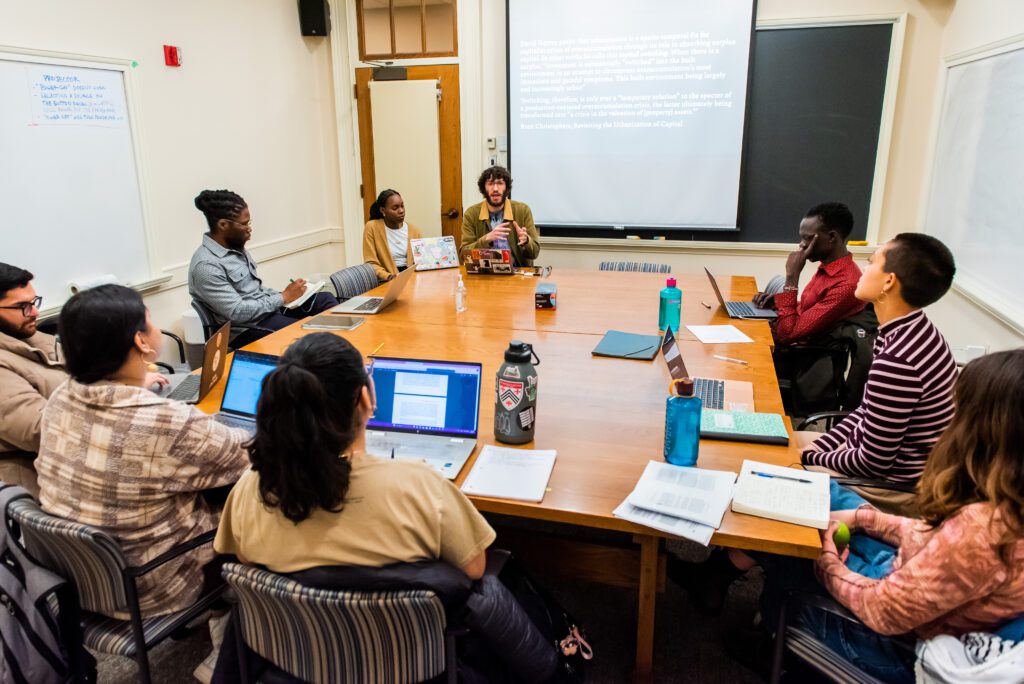Mobility, Power, and Politics
Instructor: Daniel Agbiboa | Course ID: 214576 | Term: 2023 Spring
What was the inspiration for this course?
The inspiration for the course came to me while doing separate research on social and political conflicts in a region of North-East Nigeria called the Lake Chad Basin. The lake connects the countries of Cameroon, Niger, Chad, and Nigeria and serves as a critical resource for regional livelihoods. However, in recent years the lake has shrunk substantially due to changing climatic factors. In a very real sense, people in the region will tell you that things are not as they used to be.
The shrinking lake has, in turn, contributed to low-intensity conflict in the region as people dependent on the lake begin to relocate. This is a region where mobility has become central to survival; herders, farmers, fishermen, traders, and local populations, all of whom rely on the lake as a life source, are experiencing new power dynamics.
The interlinkages among mobility, power, and politics led me to reflect more broadly on the intersection of climate change and conflict, displacement, and mobility. The course explores these issues using a mobility lens with a focus on the interconnectedness of climatic and social threats and solutions.
What is a “mobility lens”? How does it relate to climate and sustainability?
The impact of climate change, through a mobility lens, is that climate change is not restricted to any one area; it is mobile at its core. The issues that we face, and ultimately the air that we breathe, at their very essence, are boundless. It is important that, in order to address such a diffuse and fluid phenomenon, we use approaches that are fluid as well. Hence, the need to have a broad, interconnected perspective when we’re thinking. This is what mobility invites us to do.
For a long time, the global appetite has been oriented toward how we can isolate ourselves from the rest of the world. The climate conversation sometimes fails to recognize that individual countries can do all they like to address the challenge and fund the most complex solutions; but if a country like Benin Republic or Chad is not plugged in, this can undermine all the work that is being done.
From a mobility lens, we see that we have complex responsibilities, not just to our local community, but also to the broader human community and the environment.

What is the scope of the class?
The scope of this class is global. During the semester, we draw case studies from Africa and Asia to North America and Europe. We also underscore the blurred boundary between the rural and the urban, and between the visible and invisible, when it comes to mobility and the climate crisis.
Cities in particular are central to any discussion around climate change. The predictions are that in coming years, exponentially more people will live in cities, making them critical sites for addressing the climate challenge. In this course, we talk about “the right to the city,” or the right for the people who inhabit the city to be part of the decision-making processes that affect their lives. This is a collective right and one that centers the voices and experiences of the marginalized and the disposable.
Parallel to the right to the city lie discussions of global climate justice. Even as many of the debates and funding around climate change are taking place in the Global North, much of the impact is being felt in the Global South. But those places are being left off the climate change map, and out of climate change conversations. Part of what we need to do is to bring the margins of climate change back to the center and to look at initiatives that are happening all around the world.
The discussions in this class examine issues at multiple levels—the local, regional, and national. These questions of climate sustainability, poverty, and inequality are important to hold together, and the mobility lens allows us to explore them with fluidity, understanding that they are all interlinked and deeply influential on each other.
What is your favorite thing about teaching this course?
My favorite part is how the learners are able to take recommended texts and breathe life into them, placing texts in the context of their own lived experiences. Learners put their own personal experiences in conversation with policy issues and in conversation with current affairs. The course allows learners to share their personal views with respect.
In this way, the learners become the main infrastructure of the class, reproducing knowledge throughout the semester. The rich, diverse experiences that are shared in the classroom help us to ground the readings. It means that someone can talk about their experience at Harvard as a minority, or that someone else can reflect on their physical and social journey to the United States and talk about the related challenges and opportunities. Such interconnections between the personal, the social, the political, and the planetary are at the very heart of mobility studies.
In the end, no one has a monopoly over knowledge. Everyone has something meaningful to contribute to discussions of mobility, power, and politics. And the first knowledge is in many ways personal and lived.
